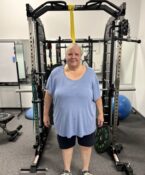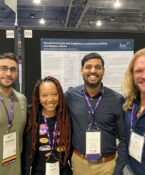Examining prevalence of Alzheimer’s in Mexican-Americans
By Jan Jarvis
One of the largest and most comprehensive studies ever conducted in the United States involving Mexican-Americans and Alzheimer’s disease is underway at UNT Health Science Center.
Interested in learning how to be a
|
The goal is to answer a consequential question: Why do Hispanics develop cognitive loss and Alzheimer’s disease almost a decade earlier than other ethnic groups?
Funded by a $12 million grant from the National Institutes of Health, the study started Sept. 4 in Fort Worth and is expected to draw 2,000 volunteers from North Texas, including 1,000 Mexican-Americans and 1,000 non-Hispanic whites. Scientists from the University of Southern California; University of California, San Francisco; and other institutions are collaborating on the project.
The data collected over the five-year study could offer earlier insight into Alzheimer’s and ultimately lead to treatments specifically tailored for Mexican-Americans, said Sid O’Bryant, PhD, Professor, Center for Alzheimer’s & Neurodegenerative Disease Research at UNTHSC.
The number of Hispanics diagnosed with Alzheimer’s disease is expected to grow by more than 800 percent, reaching one million by 2030. Yet data about this fast-growing population is extremely limited. Hispanics account for less than 1 percent of participants in clinical trials involving Alzheimer’s disease.
“This is the first project to specifically attempt to understand how different biological causes relate to Alzheimer’s disease across ethnicities,” Dr. O’Bryant said. “By looking at different potential causes related to memory loss, we may be able to target the right pathway at the right time with the right intervention.”
The ultimate goal: tailoring treatments to a patient’s biology, rather than taking a one-size-fits-all approach to treating Alzheimer’s disease.
Participants in the study must be age 50 and older and will be seen twice during the five-year study. Each participant will receive advanced brain imaging, an interview, cognitive testing and blood work at both visits.
This study is so extensive that a robot has been purchased to process the 400,000 separate blood tubes that will be stored in a bio-repository at UNTHSC and made available to researchers globally. To handle the 4,000 MRIs required, UNTHSC has contracted with Midtown Medical Imaging in Fort Worth and the Mark and Mary Stevens Neuroimaging and Informatics Institute at the University of Southern California for MRI analyses.
The University of Southern California lab, led by Arthur W. Toga, PhD, is overseeing the storage and analysis of MRI data, including both connectivity maps and structural images. Also participating in the project is Kristin Yaffe, MD, from the University of California, San Francisco’s Weill Institute for Neurosciences.
The data generated by this study could answer not only why Mexican-Americans develop cognitive loss and Alzheimer’s earlier than non-Hispanic whites but also launch other studies that will have a significant impact on the disease.
For example, researchers also will use the data to explore factors such as diabetes and metabolic disturbance that may play a key role in cognitive loss and Alzheimer’s disease among Mexican-Americans. Research suggests that diabetes and depression may be of particular importance in cognitive loss and Alzheimer’s disease among Hispanics.
Hispanics faces a greater risk of developing diabetes than non-Hispanics and are about 50 percent more likely to die from the disease, Dr. O’Bryant said. The same is true for depression, which Hispanics face as much as a 44 percent increased risk of developing than non-Hispanic whites.
“It could be that diabetes and metabolic dysfunction or depression – or perhaps a combination of both – are of major importance to memory loss and Alzheimer’s disease among Mexican-Americans,” Dr. O’Bryant said.
The project is also designed to address the issue of access to care, a concern compounded by the fact that many Mexican-Americans rely on primary care clinics, where Alzheimer’s is often underdiagnosed.
To address this issue, Dr. O’Bryant has developed a blood test that can be administered by primary care physicians to diagnose Alzheimer’s disease or detect early signs of cognitive problems. This blood test, which looks for specific biomarkers for Alzheimer’s, also will be tested in the study.
“We hope to keep this study going for 20-plus years, so we are better able to predict who is at risk,” Dr. O’Bryant said. “Then we can start designing preventions specifically tailored for Mexican-American older adults.”
***
This research is supported by the National Institute on Aging in the Institutes of Health under award number R01AG054073. The content is solely the responsibility of the authors and does not necessarily represent the official views of the NIH.






Social media